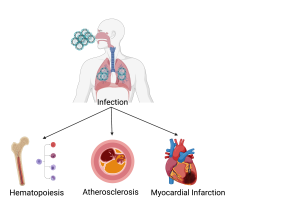Clinically, it has been observed that the current COVID-19 pandemic and past influenza pandemics/endemics are associated with accelerated cardiovascular disease and increased incidences of adverse cardiovascular events. Yet the mechanisms underlying this are unknown. Interestingly, this correlation can often be appreciated in the absence of direct infection of the heart and/or vasculature by these acute respiratory pathogens, suggesting that long-distance immune axes may be responsible for this complex phenomenon.

The bone marrow generates all circulating leukocytes via a process known as hematopoiesis and we recently showed how dysregulated neuronal control of hematopoiesis can accelerate cardiovascular disease. Immunity to respiratory infections, like influenza, requires hematopoiesis to provide inflammatory cells to the site of infection as a host defense strategy. As these cells migrate to the lung from the bone marrow through the vasculature, we are interested in characterizing how respiratory infections modulate hematopoiesis and see whether this alters atherosclerotic disease progression and myocardial infarction risk.
